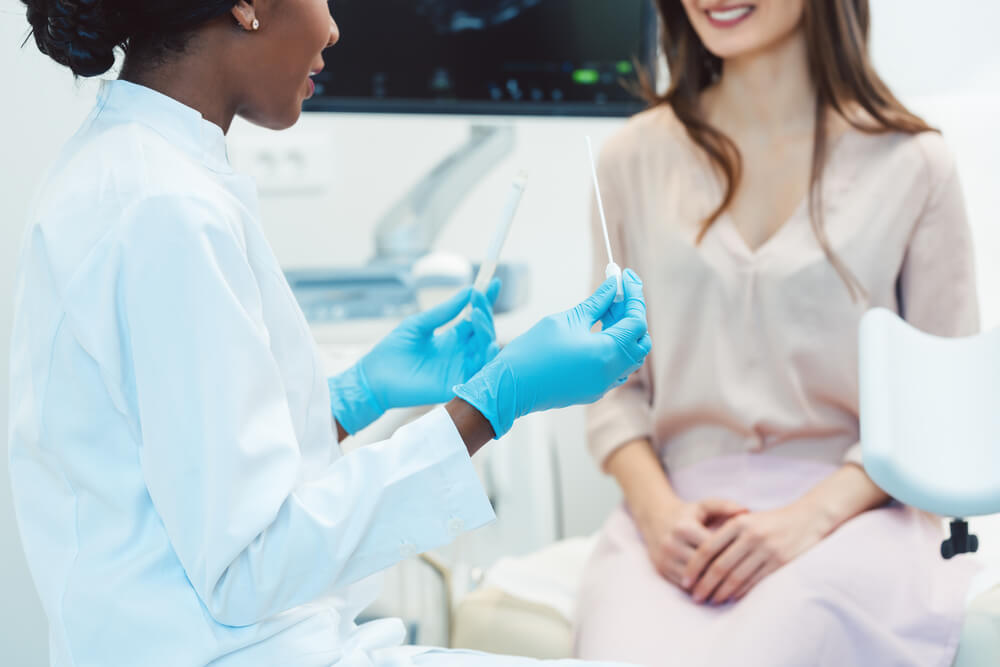Typically, we can define safe sex as sexual contact between two people that protect each participant against unplanned pregnancy and STIs or sexually transmitted infections. Safe sex does not involve body fluid exchange (think semen, vaginal fluids, and blood) between the partners who are having intercourse.
In essence, this would be it. Still, to give a more rounded answer, we should also talk about the chances of STD (sexually transmitted diseases) infections, best safe sex practices, condom protection, STI risk factors, and even STD testing.
As such, this blog post will aim to cover the essentials you need to know about safe sex and avoiding infections and unplanned pregnancies.
Unprotected Sex and STI Risk Factors
When not practicing safe sex, partners have a higher chance of STDs. Unfortunately, this isn’t only the case with genital sex. Namely, any form of sexual contact may pose STI risk factors, may that be oral, anal, or vaginal. In some cases, even skin-to-skin contact may end in an infection.
There are specific STIs like genital warts and syphilis, for instance, that can spread by having intercourse with an infected partner when a rash or sore is present. To make matters even more complicated, unborn babies may also be at risk. In the case of some infections like HIV or congenital syphilis, the infection can pass from the mother to the baby throughout the pregnancy or at birth.
Needless to say, STIs should be addressed by a medical expert because if left untreated, they can lead to severe illnesses and have severe impacts on the patient’s health, such as PID (pelvic inflammatory disease) in women and infertility in both sexes.
Some of the most common STIs include the following:
- Gonorrhea
- Syphilis
- Genital herpes
- Chlamydia
- Genital warts
- HIV
- Mycoplasma genitalium
- Hepatitis A, B, C
To make matters even more complicated, not all infections have apparent signs, and some partners may not even be aware of the fact that they, in fact, have an STI. This is why safe sex should be even more critical, along with using condom protection to minimize STI risk factors.
About Condoms

Condoms are excellent at reducing STI risk factors as they literally act as a physical barrier that stands in the way of body fluid exchange. Still, you should know that they don’t provide total protection against infections and unwanted pregnancy. However, they are among the safest options for planned parenthood and proper protection.
Essentially, they stop sperm from entering the vagina, anus, or mouth and, as such, lessen STI risks and chances of getting STDs.
Typically, there are three main types of condom protection available:
- External or male condoms: these are strong rubber pouches coming in different variations, and those who are allergic to latex can opt for non-latex options.
- Internal or female condoms: these are synthetic rubber products with two flexible rings on each end. They come pre-lubricated and are created to fit inside the vagina or anus.
- Diaphragm – these are shallow and soft silicone cups that also fit inside the vagina, covering the cervix. These cups are great against pregnancy but won’t protect against STIs.
Proper Condom Protection
To be the most effective, here are some valuable tips for using condoms and other barrier methods the right way:
- Whenever you have intercourse, use new and lubricated condoms.
- Avoid using expired condoms.
- Open the packaging carefully so as not to tear the condom.
- Use water-based lubricants to avoid damaging the condom.
- Use them from start to finish when having sex.
- You can use dental dams during oral sex.
- Don’t store condoms in hot places, as high heat can damage them.
- Don’t reuse them, as they are single-use products.
Tips for Practicing Safe Sex
Apart from using condoms to decrease the risk of infections and diseases, you can also do other things to make sex safer. These include the following:
- Getting tested for STIs if you have concerns
- Limiting the number of partners you have sex with
- Talking with your partner about sexual health and your sexual needs
- Receiving treatment for any sexually transmitted infections
- Seeking medical advice and avoiding sexual until advised otherwise by your healthcare provider
- If somebody is pressuring you to have sex and you don’t want it, let them know – sex must be consensual by law
- Avoid sex under the influence of alcohol and drugs, as they can cloud your judgment
- Explore other contraception options in addition to condom use to avoid unwanted pregnancies
- Avoid sex if you or your partner have sores, ulcers, warts, blisters, or rashes on their genitals, anus, or mouth
- Avoid sex if you or your partner has inflamed piercings in their genital area or have a throat infection
- Avoid sex when the female partner is on her period
Don’t Think About Safe Sex As a Chore
It’s important to remember that safe sex shouldn’t be a drag. Instead, it should be enjoyed and become second nature if you are sexually active. It might be challenging to get a head start on the topic, but these suggestions will probably be helpful:
- Always carry a condom with you or keep them at home so you are prepared for any cases in which you may have sex with your partner.
- Learn proper condom usage. They might be a bit uncomfortable, but they are still better than getting an infection.
- Use condoms during foreplay as well.
- If you find that condoms decrease your pleasure, consider using water-based lubricants for extra sensitivity.
- Use condom vending machines if you feel embarrassed to buy them over the counter.
- Consider using hormonal contraception methods like mini birth control pills, vaginal rings, mini pills, and LARC options like injections, implants, and IUDs to avoid unplanned pregnancies.
- Educate yourself on STI risk factors.
- Consider more frequent STI testing if you are sexually active and practice unsafe sex.
Remember that hormonal birth control, IUD, spermicide, etc., will protect against unwanted pregnancies, but these don’t protect against STDs.
What If You Suspect an STI?

Remember, these infections are common, and chances are that most people will catch at least one in their lifetime. Most are curable, and all of them can be effectively treated.
If you are active sexually, our best advice is to consider regular STI testing, meaning at least once each year. Still, if you have multiple sexual partners within a short period (for instance, more than ten partners in a span of three months), you may consider testing every three months.
Fortunately, testing is straightforward, usually consisting of a simple urine or blood test. As such, it’s essential to get tested if:
- You are experiencing any STI symptoms after having unsafe sex.
- The condom slipped off or broke during intercourse.
- At a start of a new sexual relationship.
- If you are planning to start a family or are pregnant.
Expert Care Makes All the Difference
Practicing safe sex may seem a bit overwhelming, especially if you are just becoming sexually active. Finding a professional and caring team of expert healthcare providers who can help you start your sexual journey is essential in learning how to enjoy sex and make it safe and healthy. As such, if you are looking for options regarding obstetrics and gynecology in South Miami, Florida, consider our team of dedicated experts.


